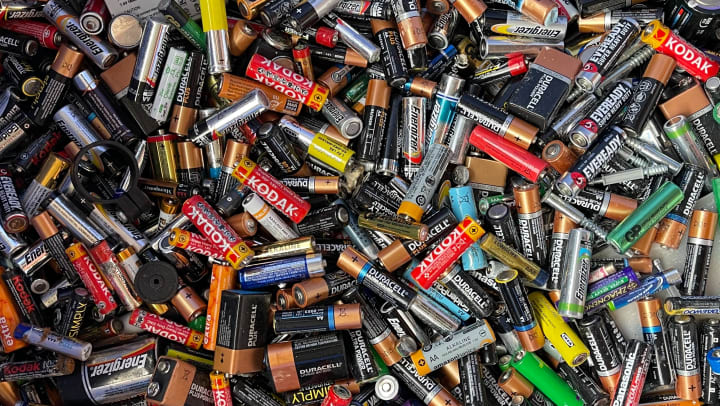Every well-prepared household should have some spare batteries on hand. These days, online retailers have made it easier to buy large packs of batteries at a reasonable price. A supply of batteries is great to have on hand in case of emergencies and power outages, but also for general convenience. How often have you found yourself combing through junk drawers to find just one more AA battery to get the TV remote working again? If you don’t know how to store batteries safely, you may find them going to waste, corroding inside your expensive electronics, or dying before you ever get a chance to use them. Luckily, storing batteries safely is easy.
1. Keep them in the original packaging for as long as possible
When you get a new package of batteries, it’s tempting to immediately open them up and simply dump them in a drawer. If you want to get the maximum use and value out of your batteries, this is one of the worst things you can do. It’s also a fire hazard! Keep batteries in their package for as long as you can. This protects them from the elements and ensures your new batteries won’t accidentally get mixed in with old ones.
How long do batteries last?
The rate at which batteries drain when not in use is called the self-discharge rate. When stored properly, alkaline batteries will typically last 5-10 years. Ni-MH (Nickel-metal Hybride) batteries usually have a shelf life of 3-5 years. For Lithium-Ion batteries, it’s 2-3 years. These are just ballpark figures, so check the packaging of your particular batteries for an expiration date.
2. Don’t store batteries inside equipment
If you’re putting an electronic item into storage and know you won’t be using it for a while, go ahead and pop the batteries out. Not only does this help them last longer, but if they corrode or leak, they won’t damage your electronics. You can always spend a few dollars on replacing a dead battery, but if battery acid ruins the inside of your device, you’re looking at a much more expensive replacement.
3. Keep batteries in a cool, dry, dark place
The most important part of knowing how to store batteries is considering sun exposure, temperature, and humidity. According to Battery University, the ideal temperature for batteries is right around 60°F. The temperature of a standard room in your home is still within the allowable range, but the closer you can get to that slightly cooler environment, the better off your batteries will be. The other two variables to keep in mind are light exposure and humidity. Ideally, batteries should be kept in a dark and dry environment.
This makes storage spaces within your home, like the attic, basement, or garage, potentially problematic. These environments can be subject to intense temperature changes and high humidity.
This also makes climate-controlled self-storage units a great place to store batteries. They protect items from the sun’s ultraviolet rays, are temperature-controlled, and don’t get overly humid.
4. Keep batteries in a container
If you can’t store batteries in their original package, you should still keep them in a non-metal container. When batteries are loose or are touching metal objects in storage, the chances that they’ll leak are higher. There are inexpensive and very effective battery storage boxes available that not only keep batteries safe but also keep them organized. Many battery storage boxes even have integrated battery charge testers to check your batteries' health. These are a great addition to any home.
5. Organize loose batteries properly
If you have a group of loose batteries to store and aren't keeping them in an organizer, separate them by size and when you bought them, then wrap them together with a rubber band. Make sure they all face the same way so that the negative and positive ends are aligned. If you store batteries in such a way that their opposing ends are touching, they can short circuit.
Always store old and new batteries separately. You don't want to mix them up, and you generally don't want to use them in the same device. We know everyone does it—but you shouldn't! Those people don't know how to store batteries safely, and you do. Mixing old and new batteries in a device can cause them to leak and degrade.
It's recommended that loose batteries be stored in separate plastic baggies to keep them from accidentally touching anything. The EPA recommends taping over the terminals to keep them from touching. Terminals can touch other batteries' terminals—or other metal items in a drawer, for example—and actually cause a short circuit or spark, creating a fire hazard. This is especially true for 9-volt batteries.
Notes on rechargeable batteries
Rechargeable batteries should be stored at 30-50% full and allowed to slowly self-discharge. Sometimes, if you store a rechargeable battery for several months when it's already dead, you'll find it impossible to revive. Never store rechargeable batteries long-term on their charger. Similarly, when batteries are full, remove them from the charger. Overcharging can degrade the battery. Rechargeable batteries can be expensive, so take care of them! It's common for people to accidentally ruin them when using them in a seasonal device. They use them in something like a fish finder for their boat, storing all of that gear for the entire winter, and then come back in the summer to find that their batteries no longer hold much of a charge.
Create a new battery routine, and keep the electricity alive!
Now that you know how to store batteries safely, it's a simple matter to implement a new battery storage routine in your home. Most people never give it any thought in the first place, and they end up wasting batteries—not to mention putting their possessions and homes at risk. By forming new battery storage habits, you'll never fall into that trap again. So load up on batteries, put them into storage, and you'll never be left out in the cold again when the power goes out, or the TV remote goes dead.
Visit us at your local BuxBear Storage location to secure a climate-controlled storage unit for all your storage needs! And give us a call with any storage-related questions. We’re happy to help!


